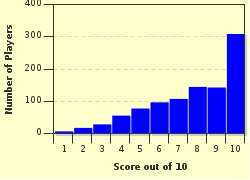Quiz Answer Key and Fun Facts
1. The islands that form Tuvalu are found in the South Pacific. They were formerly known as the Ellice Islands, part of the Gilbert and Ellice Islands. Where does the "Ellice" derive from?
2. Tuvalu's present name reflects the number of islands within the group that have, traditionally, been inhabited. Which of the following comes closest to its meaning?
3. Tuvalu was under the protection of which European colonial power from 1892 until its independence in 1978?
4. Tuvalu's main atoll is Funafuti. As might be expected, there are various stories as to how it came to be settled. Most, however, centre around an ancestor named Telematua who arrived by canoe from one of Tuvalu's closest neighbours. Which of these islands is he said to have come from?
5. Tuvalu threw itself behind the 350.org campaign, started by American, Bill McKibben. This is not surprising because 350.org's activities centre around which of the following, that is seen as a major threat to Tuvalu's existence?
6. In 1916, the Funafuti Provisionals achieved notoriety around the world, but what are they?
7. Tuvalu's motto is "Tuvalu mo te Atua" which communicates something of its religious beliefs, but how does this phrase translate into English?
8. Which of the following is a major source of income for the people of Tuvalu?
9. Despite having a very small population, Tuvalu managed to field a soccer team that took part in the qualifying competition for the 2010 FIFA World Cup. What was unusual about their involvement?
10. With the introduction of the Internet, Tuvalu has generated considerable revenue from its domain suffix. This is which of the following?
Source: Author
glendathecat
This quiz was reviewed by FunTrivia editor
ozzz2002 before going online.
Any errors found in FunTrivia content are routinely corrected through our feedback system.

